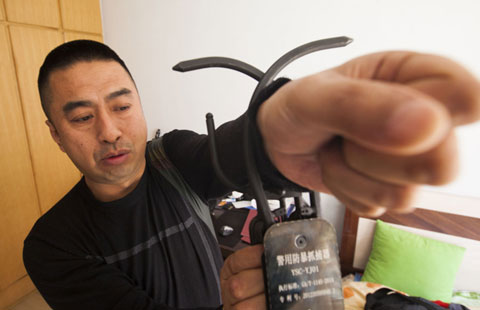Grain security system needs reevaluation
Updated: 2015-04-22 07:38
(China Daily)
|
||||||||
|
DRC Minister Li Wei delivers a speech at the opening ceremonty of the 2014 China's Food Security and Food Safety Strategy Summit. |
As a historically agrarian society, China attaches overwhelming significance to food security.
Despite recent suggestions that it is financially feasible, even more cost-effective, for China to rely more on the international market for grain supplies, the government considers it too risky to abandon self-sufficiency.
As the popular saying goes, "grain in the hand, no panic in the heart". So we come to China Grain Reserves Corporation, or Sinograin, whose mission, according to itself, is to "safeguard national food security".
Yet the latest grain switching scam at warehouses in Northeast China's Heilongjiang and Jilin provinces, two of the country's main grain-producing bases, shows how badly Sinograin has failed in its self-proclaimed mission, and thus failed the nation.
In apparent collusion with grain merchants, local barns contracted by Sinograin purchased old rice in the name of newly harvested grain and profiteered from the price differences.
That means the compulsory periodical replacement of old grain in stock did not happen. That also means a sizeable part of current stockpiles is hardly usable as food grain.
Fortunately it has not taken a real famine for us to discover the worrisome state of our strategic grain reserves; or the consequences could be unimaginable.
Despite their habitual irresponsiveness to similar previous allegations, national and local grain authorities have at least appeared more serious this time. They have promised thorough probes and ordered targeted screening of warehouses.
Such reactions may suffice to clear the mess that has been brought into the daylight. But it is more important to take a serious look at the claims that such a practice is a "tacit rule" at government grain warehouses across the country, and that it is an "open secret" among insiders. If that is the case, we have another national security problem to worry about.
Meanwhile, the calls for reevaluating the existing grain security guarantee mechanism, the grain reserves scheme in particular, should no longer remain unanswered. It is essential to find out whether or not the scam is only an outcome of mismanagement on Sinograin's part.
Never forget the 2013 survey by the Communist Party of China's discipline watchdog, which reported "frequent, massive" cases of corruption at the grassroots in Sinograin establishments.
If it is truly beyond its capacity to single-handedly manage our national grain reserves, changes must be made.

 Chinese real estate deals in US topical forum
Chinese real estate deals in US topical forum
 Singing Chinese language's praises
Singing Chinese language's praises
 Foreign girls join in ancient Chinese coming-of-age ritual
Foreign girls join in ancient Chinese coming-of-age ritual
 Shanghai auto show kicks off
Shanghai auto show kicks off
 Annual Tweed Run held in central London
Annual Tweed Run held in central London
 Wood sculptures discovered inside cliffside cave in Chongqing
Wood sculptures discovered inside cliffside cave in Chongqing
 Antiriot device earns national patent for Jilin farmer
Antiriot device earns national patent for Jilin farmer
 7 trends that will shape China's supply chain
7 trends that will shape China's supply chain
Most Viewed
Editor's Picks

|

|

|

|

|

|
Today's Top News
Bloomberg: Chinese investment sustains US cities
China, Pakistan elevate ties, commit to long-lasting friendship
'Belt-Road' to exchange goodwill with economic coopertation
Swarm of Chinese applications deplete US investor visas
AIIB looks to be efficient and 'green'
Basketball star says he has Beijing in his heart
Bridging cultures with laughter
and song
Central bank cuts ratio for reserves
US Weekly

|

|







